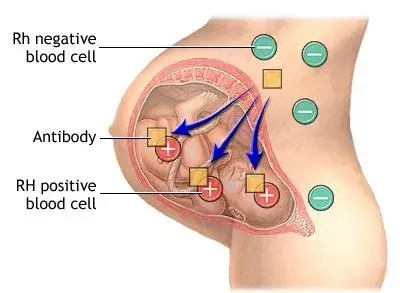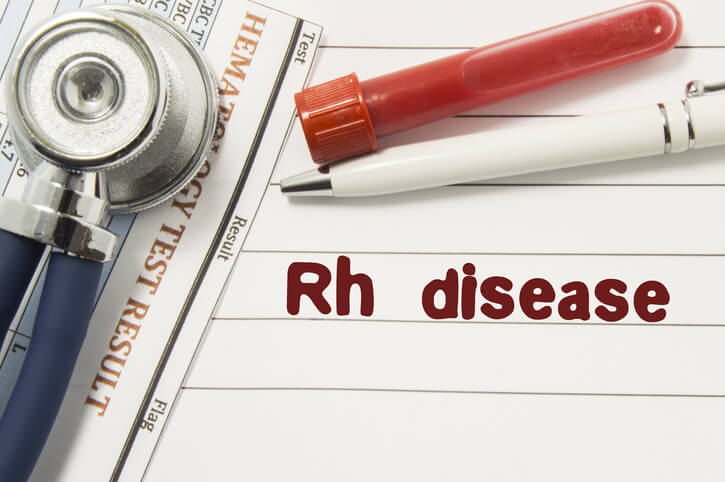Rhesus Disease: Risks and Prevention

Rhesus disease, also known as hemolytic disease of the newborn, is a condition that can occur during pregnancy when a woman who is Rh-negative (does not have the Rh factor on her red blood cells) is exposed to Rh-positive blood from her fetus. This can cause the woman’s immune system to produce antibodies against the Rh-positive blood, leading to serious health problems for the baby.
Causes of Rhesus Disease

Rhesus disease occurs when an Rh-negative woman becomes pregnant with an Rh-positive baby. During pregnancy, some of the baby’s blood cells may cross the placenta and enter the mother’s bloodstream. If this happens, the mother’s immune system will recognize the Rh-positive blood as foreign and produce antibodies against it. These antibodies can attack the baby’s red blood cells, leading to anemia and jaundice. In severe cases, Rhesus disease can cause brain damage, heart failure, and even death.
Symptoms of Rhesus Disease
Rhesus disease typically does not cause any symptoms in the mother. However, the baby can develop symptoms such as jaundice (yellowing of the skin and eyes), anemia (low red blood cell count), and enlarged spleen or liver. In severe cases, the baby may also experience brain damage, heart failure, and other serious complications.
Diagnosis and Treatment

Rhesus disease is diagnosed through a blood test. The test is performed on the mother during pregnancy to check for the presence of Rh-positive antibodies. If the test is positive, the baby will be closely monitored throughout the pregnancy to check for signs of anemia or jaundice.
The most effective way to prevent Rhesus disease is by administering the Rh immune globulin (Rhogam) injection to Rh-negative women. This injection helps prevent the formation of Rh-positive antibodies and can be given at specific times during pregnancy, such as after a miscarriage or after delivery of an Rh-positive baby.
How Common is Rhesus Disease?
Rhesus disease is relatively rare, affecting about 1 in 10,000 pregnancies in the United States. However, it is more common in countries where blood transfusions and prenatal care are not as readily available.
How is Rhesus Disease Treated in The Newborn?

If Rh disease is suspected or diagnosed in the newborn, the baby will be closely monitored for signs of anemia or jaundice. Treatment may include phototherapy (light therapy) to help break down the bilirubin in the baby’s blood, and in severe cases, a blood transfusion may be necessary.
What Are The Long-term Effects of Rhesus Disease?
The long-term effects of Rhesus disease can vary depending on the severity of the condition. In mild cases, the baby may not experience any long-term effects. However, in severe cases, the baby may experience brain damage, heart failure, or other serious complications.
Can Rhesus Disease Be Prevented in Future Pregnancies?

If a woman has had a previous pregnancy affected by Rhesus disease, her healthcare provider will likely recommend Rh immune globulin (Rhogam) during her next pregnancy to prevent the formation of Rh-positive antibodies. Additionally, it is important for women to know their Rh status and discuss their risk for Rhesus disease with their healthcare provider.
In conclusion, Rh disease is a serious condition that can occur during pregnancy when an Rh-negative woman is exposed to Rh-positive blood from her fetus. It can be prevented with the Rh immune globulin (Rhogam) injection and it’s important for women to know their Rh status and discuss their risk for Rhesus disease with their healthcare provider. Early detection and treatment can often lead to better outcomes for the baby.
Conclusion
Rhesus disease is a serious condition that can occur during pregnancy when an Rh-negative woman is exposed to Rh-positive blood from her fetus. It can cause serious health problems for the baby, including brain damage, heart failure, and even death. Fortunately, Rhesus disease can be prevented with the Rh immune globulin (Rhogam) injection, which can be given to Rh-negative women at specific times during pregnancy. It’s important for all women to be aware of their Rh status and to discuss their risk for Rhesus disease with their healthcare provider.







